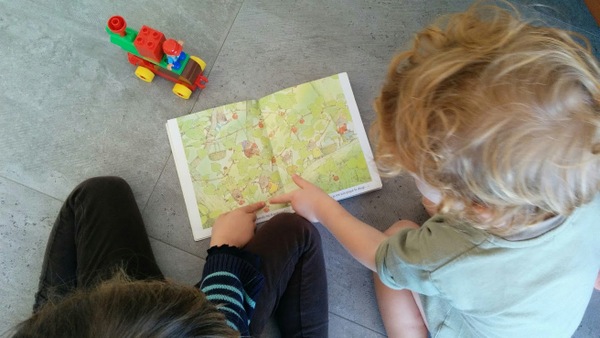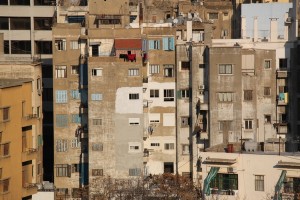As parents we make a ton of decisions on behalf of our kids and languages are no exception. We decide what language we will each speak to them, when, what language books to buy, which type of school to send them to, which language to speak in our couple…. But something we have no control over – or very little – is what language our kids will speak to each other. I’ve been waiting impatiently to see how sibling dynamics will develop between my two kids and now the little one is actually talking, there is finally something to observe. He can say things like “Mummy eating toast, daddy eating porridge.” If he sees a book he likes, he says “Want-it have-it book. Please mummy story.” So now that we actually have some verbal communication to speak of, here is an update on my two kids and the three-and-a-bit languages we live with.
The oldest (4 years and 3 months) is fairly articulate in both home languages and knows quite a bit of vocab in Spanish, her school language. I have to be vague about her knowledge here, as she hates being quizzed, so I have no idea exactly what she has taken on board in the last month of full-time Spanish school. I know she knows her numbers, most colours, greetings and a fair bit of everyday vocab. I’m pretty sure she must understand the common instructions at school because her teacher says she does what she is told. She doesn’t mix languages, never has.
The little one, at 2 years and 1 month says hola and gracias in Spanish, along with hundreds and hundreds of English and French words. He doesn’t mix languages, always speaking English to me and French to his dad. He often says something to me and then turns and translates to his dad.
As for Arabic, the little one can use half a dozen words and my oldest, my little Beiruti, can understand a few expressions in addition to a limited vocab. Arabic exposure is minimal. This is just what they get from me and a few books I read them.
The interesting bit is listening to them speak together. I had expected them to speak English to each other above all else. After all, I look after them all day while dad works (though the oldest is now at school in Spanish until 2pm). I was afraid they would pick English and stick to it, even though at meals and on weekends, their dad talks plenty of French to them. As a couple, we speak a fair amount of English in front of them, even though we also speak French together whenever I have the energy. With the oldest being a girl, it could also be that she mimic me, her mother, more, and play mother on the “baby” of the family. That would mean English.
However, I’ve been delighted to see that they switch language regularly, and speak both English and French together, though not randomly. Whoever starts the conversation seems to dictate the language, and the second speaker follows suit. They are definitely influenced by who is around. When with me, they are more likely to speak English amongst themselves, which is only natural and socially normal. When they are with their dad and I am out of the room, I hear them talk together in French more. However, external presence isn’t the only influence. They will both start talking in French together about a French book. Or recycle a joke they had enjoyed in French with daddy. Basically, they adapt to whichever language is favoured by the context around them.
I am looking forward to eavesdropping on a further facet next week - the cousin dynamics, as we have my sister’s family coming to stay. They are also bilingual but living in France, schooled in French. As is common in this type of bilingual set up, the minority language (English) has decreasing influence as you get further down the birth order, while the importance of the community language grows. Maybe my kids will speak English with the older cousins and French with the younger, or maybe they will be influenced by us mums chatting in English all day.
It’s too early to say if my kids will continue switching between the two languages together. Maybe they will settle on one. If we stay here in Spain a long time, I can’t help but expect them to end up speaking the community language – Spanish – together . My husband speaks French to his parents but English to his siblings because of living in the US for the first 14 years. I think I’d feel funny about my kids speaking a language I wasn’t fluent in as their preferred language together. Then again, if we stay that long I’d better be fluent!
Tricks with tenses
The pretérito perfecto is the sneakiest false friend I have met so far. Yes, it’s true that most of the time it equates to the English present perfect. It’s true that we say, “Have you (ever) eaten paella?” and “Has comido paella (alguna vez)?” [both pretérito perfecto], whereas we say, “I went to Rome in 2012,” and “Fui a Roma en 2012,” [both simple past]. English speakers can just translate I did as hice and I have done as he hecho, word for word… for the most part. They have an advantage over the French who have only one form: j’ai fait.
BUT in English you do not use the present perfect with a specific moment in time. You cannot say “I have taken the train on Saturday.” Or: “I have eaten breakfast at 10 o’clock.” Or: “I have been to Italy in 2012.” Or even, “I have been to Italy five years ago.”
In Spanish, on the other hand, you CAN combine the present perfect with a moment in time. What matters is not so much whether a precise moment in time is mentioned; what matters is if the general period of time is over or if it is still ongoing, or very recent and relevant to now.
At 11am you can still say: “Esta mañana he desayunado a las ocho.” In fact you should say it, because the morning is not over yet. But once you are home for dinner, you can say “Esta mañana desayuné a las ocho.” Because the time period (la mañana) is completed.
NB In Latin America, the simple past (hice) has gained ground over the present perfect (he hecho) apparently influenced by the same phenomenon in US English compared to British English. If you are in one of the Americas and this post doesn’t make sense to you there is a good reason for that!



